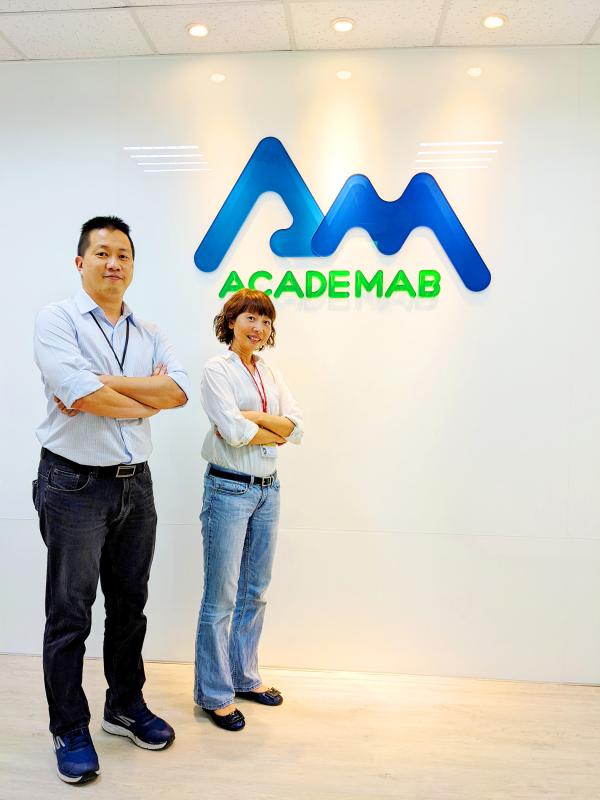Pharmaceutical start-up AcadeMab Biomedical Inc (研生生醫) said it has been developing a COVID-19 antibody drug, an endeavor not being undertaken by many other Taiwanese pharmaceutical firms.
The company was spun off from Academia Sinica’s Institute of Cellular and Organismic Biology in 2020 and has only 16 employees. It has set its sights on the innovative field of the monoclonal antibody treatment of tumors.
The start-up began developing antibody drugs in January, after seeing that COVID-19 vaccines could not effectively protect people from new variants of SARS-CoV-2, AcadeMab Biomedical chief strategy officer Pearl Fong (俸清珠) said in an interview with the Taipei Times on Thursday.

Photo courtesy of AcadeMab Biomedical Inc
The development of COVID-19 antibody drugs focuses on the sequences of the antibodies produced in the body following vaccination, Fong said.
The method does not require any information on the sequences of SARS-CoV-2, she said.
“Specifically, we need to know the DNA sequences of the Y-shaped antibodies carried by people’s memory B cells. Once we obtain the sequences, we can replicate the antibodies,” she added.
The start-up for at least four weeks collected blood samples from five people who had received three doses of COVID-19 vaccines. It then used a method called “cell shorting” to isolate memory B cells and used genetic engineering to decode the sequences of the antibody, AcadeMab Biomedical project manager Chiang Pao-yin (姜伯穎) said.
Getting the right sequences was not easy, Chiang said.
A 20 to 30 milliliter blood sample contains about 40 million cells, from which about 100,000 memory B cells can be isolated, Chiang said.
Using advanced technology, the company initially obtained about 2,000 sequences of antibodies and selected 163 that were expected to be the most effective in fighting against SARS-CoV-2 variants, he said.
“It is like making a key. It must not only have the right shape to fit in the hole, but it also has to be long enough to be used. The right antibodies must not only bind with the spike protein of the virus, but bind firmly,” Chiang said.
The start-up selected 10 sequences and tested them against the Omicron subvariants of SARS-CoV-2 and eventually chose four that showed the most potential, Chiang said, adding that its experimental drug is called SB-001.
Explaining how antibody drugs fight against new SARS-CoV-2 variants while vaccines cannot, Fong said that vaccines and antibody drugs use different mechanisms.
Vaccines prompt the immune system to produce antibodies, but after a given period, only a few antibodies that are most effective against a variant remain in the body, Fong said.
However, it is possible that these antibodies cannot attack new subvariants, she said.
Developers of COVID-19 antibody drugs have deep knowledge of antibody sequences, Fong said.
“It’s like we have a database. We can always research which sequence works best against the latest subvariant and change our formula accordingly,” Fong said.
An antibody that does not work well against an older subvariant could be effective against a new subvariant, she added.
“That has been the case with Eli Lilly and Co. Its first two antibody drugs were approved, but they did not work against later Omicron subvariants. However, the company found another sequence and used it to develop a new antibody drug,” Fong said.
AcadeMab Biomedical is one of only a few Taiwanese companies working on COVID-19 antibody drugs, she said.
Fong said there are two reasons that Taiwanese companies prefer to develop COVID-19 vaccines over antibody drugs, with about 10 firms working on vaccines.
“First, vaccines use fewer proteins than antibody drugs, so vaccine developers can conduct research more easily with limited manufacturing capacity. Second, the requirements for clinical trials involving antibody drugs are much stricter than those for vaccines,” she said.
Antibody drugs are mainly used for treatment instead of prevention, Fong said, adding that they can be used for prevention in some cases, she said.
People who are planning to travel to high-risk areas could take the drugs before embarking on their trip, she said.
As AcadeMab Biomedical focuses on research, it plans to find a manufacturing partner to codevelop SB-001, Fong said, adding that the company has been in talks with several firms and hopes to finalize a deal by the end of this year.
It plans to apply for emergency use authorization in the US and hopes to start phase 1 human trials by June next year, she said.

SETBACK: Apple’s India iPhone push has been disrupted after Foxconn recalled hundreds of Chinese engineers, amid Beijing’s attempts to curb tech transfers Apple Inc assembly partner Hon Hai Precision Industry Co (鴻海精密), also known internationally as Foxconn Technology Group (富士康科技集團), has recalled about 300 Chinese engineers from a factory in India, the latest setback for the iPhone maker’s push to rapidly expand in the country. The extraction of Chinese workers from the factory of Yuzhan Technology (India) Private Ltd, a Hon Hai component unit, in southern Tamil Nadu state, is the second such move in a few months. The company has started flying in Taiwanese engineers to replace staff leaving, people familiar with the matter said, asking not to be named, as the

The prices of gasoline and diesel at domestic fuel stations are to rise NT$0.1 and NT$0.4 per liter this week respectively, after international crude oil prices rose last week, CPC Corp, Taiwan (台灣中油) and Formosa Petrochemical Corp (台塑石化) announced yesterday. Effective today, gasoline prices at CPC and Formosa stations are to rise to NT$27.3, NT$28.8 and NT$30.8 per liter for 92, 95 and 98-octane unleaded gasoline respectively, the companies said in separate statements. The price of premium diesel is to rise to NT$26.2 per liter at CPC stations and NT$26 at Formosa pumps, they said. The announcements came after international crude oil prices

STABLE DEMAND: Delta supplies US clients in the aerospace, defense and machinery segments, and expects second-half sales to be similar to the first half Delta Electronics Inc (台達電) expects its US automation business to remain steady in the second half, with no signs of weakening client demand. With demand from US clients remaining solid, its performance in the second half is expected to be similar to that of the first half, Andy Liu (劉佳容), general manager of the company’s industrial automation business group, said on the sidelines of the Taiwan Automation Intelligence and Robot Show in Taipei on Wednesday. The company earlier reported that revenue from its automation business grew 7 percent year-on-year to NT$27.22 billion (US$889.98 million) in the first half, accounting for 11 percent

A German company is putting used electric vehicle batteries to new use by stacking them into fridge-size units that homes and businesses can use to store their excess solar and wind energy. This week, the company Voltfang — which means “catching volts” — opened its first industrial site in Aachen, Germany, near the Belgian and Dutch borders. With about 100 staff, Voltfang says it is the biggest facility of its kind in Europe in the budding sector of refurbishing lithium-ion batteries. Its CEO David Oudsandji hopes it would help Europe’s biggest economy ween itself off fossil fuels and increasingly rely on climate-friendly renewables. While